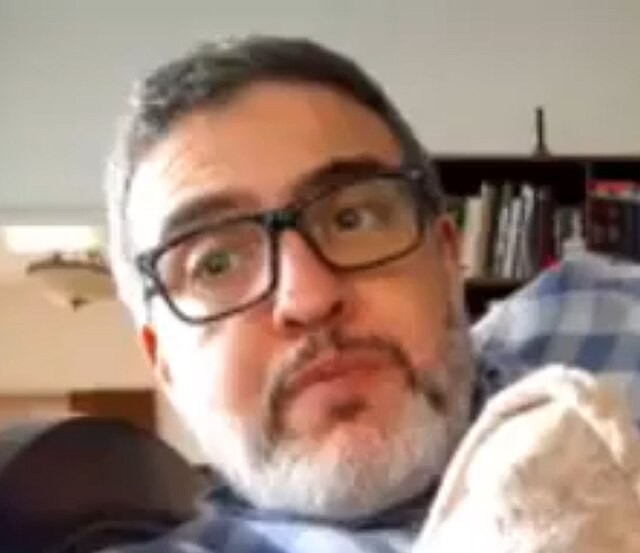While shadowy back-room profiteers count up newly-acquired millions and billions from armament purchases or sales of frocking gas, I think the rest of us should oppose both Putin’s criminal war as well as all attempts, on the other side, to prolong, extend and gain from it.
That is where Germany comes in, with both feet. On February 3rd 2015 George Friedman, founder of Stratfor, the so-called world’s top geopolitical intelligence platform, said that one of the main goals of US foreign policy had long been to make sure there was no cooperation between Russia and Germany.
This goal now seems to have been achieved – once again. The current media-incited atmosphere of hatred against anything remotely connected with Russia recalls the iciest phase of the Cold War.
The uneasy coalition now governing the country, after finally achieving a three-party truce and dropping plans for compulsory anti-Covid vaccination, soon faced a far more fundamental issue; what assistance should Germany send Ukraine. Should it consist of money and light weapons or extend to “heavy weapons” like tanks and artillery?
The Greens, once seen as a left-leaning party, are now led by the sharpest of Russia-haters, who spouted incendiary statements long before Putin sent in the troops. Most prominent are young, virulent Foreign Minister Annalena Baerbock and Vice-Chancellor/Economics-Environment Minister Robert Habeck, both Atlanticists with what might better be called “Potomac” positions.
As for the Free Democrats, whose allegiance, quite overtly, is to big business, the heavier the weapons the better; yes, tanks, missiles, artillery, anything. In this – and despite coalition-soothing words from their leader, Finance Minister Christian Lindner – the FDP leans suspiciously towards the Christian Democrats, now trying to regain strength in opposition, well to the right of its retired leader Angela Merkel.
Olaf Scholz changes his mind
The Social Democrats, strongest party in the Bundestag and led by Chancellor Olaf Scholz, seemed to support a surprisingly different position. Germany, fifth place in armaments exports globally, has long kept to an older West German rule not to send weapons into conflict areas – or partially kept to it, since somehow there was frequent leakage. Scholz warned almost movingly that heavy weapons sent to Kyiv would expand the conflict, involve more countries and increase chances for a major war, possibly atomic. He seemed to be reflecting the position of those industrial sectors which depended heavily on exports to Russia and, more important, Germany’s considerable dependency on Russian oil, coal and gas to power its economy. In February Germany was importing 55% of its gas from Moscow; despite all its haste, developing substitute sources like oil from the Persian Gulf or the Atlantic and gas from American fracking would take time and cause great unemployment, shortages and general misery. The need for Russian energy imports and sales to Russia and China had long been a balancing factor against belligerent Atlanticists and their allies the armament groupies.
But it was these forces who won the day. An immense campaign was intensified against Scholz, with the opposition Christian Democrats loud and angry and his two coalition partners offering no real support. The media offered endless accounts of war damage and atrocities, true or alleged, with constant repetition of the worst pictures. The USA and eastern Europe, above all Poland and the Baltic countries, traditional foes of Russia, tightened the screws against Scholz’ “hesitancy”. Most unrelenting was the Ukrainian ambassador to Germany, Andriy Melnyk, whose attacks against Chancellor Scholz, ex-Chancellor Merkel and President Steinmeier were anything but diplomatic.
“The Germans are going to regret that they are once again the last ones to agree,” Melnyk declared. “We (Ukraine) have become the biggest victim of this perverted relationship. Ukrainians are paying for this failed German policy with their lives.” He elaborated further that “this kind of hypocrisy with Russia dates back to Nord Stream 1 (gas pipeline)… Germany’s huge dependence on Russia, at a time of the worst aggression since the Second World War, is shameful,” Melnyk proclaimed before stating that “Germany is as far away from giving us the support we need today as it was at the start of the war… More than 40 days later, the German political elite apparently still does not believe that Ukraine can win the war.”
For many his blatant imperatives went much, much too far for an ambassador. But he was supported by President Zelenskyy who, when Steinmeier planned a joint trip to Kyiv with the presidents of Poland, Estonia, Latvia and Lithuania “to send a strong signal of joint European solidarity” he was told that he was not welcome there because of his year-long détente policy towards Moscow. This, based on his years as foreign minister with Angela Merkel, was an almost unprecedented snub. But while she – no longer in office – stood by her 2008 stance against admitting Kyiv to NATO, Steinmeier abjectly acknowledged that his policy of détente “had been mistaken”.
In the end Scholz, too, could not withstand the pressure and backed down, announcing “…yesterday we decided that Germany should hand over weapons to Ukraine to defend itself. Putin’s aggression meant we could give no other answer.” That means tanks to Kyiv – perhaps older Soviet-made tanks which the Ukrainians were acquainted with, to be sent by Slovenia, which would then receive a similar number of modern tanks from Germany in a face-saving swap.
Increased military budget
In the changing atmosphere, Scholz made doubly clear that he was free of any pacifist impulses he may possibly have entertained. Bowing to the usual querulous complaints of Defense Ministers (the new one, Christine Lambrecht, third woman in a row in that job, but this time a Social Democrat), that the Bundeswehr was far from its necessary military fitness, Scholz proposed a rise of 100 billion euros ($112 billion USD) in the amount spent on the military. Though threatened by no-one, Germany had already seen the largest defence budget increases of all major 15 countries. And now this enormous new increase!
A part of the sum would be for travel; its contingent on manoeuvres in Lithuania was to be increased. Minister Lambrecht said that Germany was strengthening its “troop contribution on NATO’s eastern flank and sending a clear sign of our resolve to our allies.” Very old German veterans might recall place names from attacks launched there against Leningrad eight decades ago. Somewhat younger men, with many-starred shoulders, clearly enjoyed the idea of being military alpha wolf in Europe.
All major parties supported the giant new spending decision. Opposed were the AfD delegates, who generally supported Putin in the past but may now being split on the issue. One single Christian Democratic maverick (from East Germany) also voted Nay. And so did the entire caucus of DIE LINKE – The Left, this time united. The party’s caucus co-chairperson, Amira Mohamed Ali (but no relation!), stated: “We from The Left cannot and will not join in such rearmament, such militarization. History teaches us that competition in arms production does not bring security. What is necessary is disarmament and diplomacy.” She also stressed that the caucus agrees that Russia is responsible for an offensive war, breaking all rules of international law.”
The West’s Imperial ambitions
The obvious plans in Washington and Berlin are to continue or expand the fighting, regardless of human losses until Russia is defeated or taken over. They embody an extreme danger, along with the xenophobic hysteria against Russia, with all its echoes from an evil past. The only possible policy in this situation must certainly include the demand for a quick end of hostilities and negotiations for a peaceful solution, despite all plans of the crusading militarists.
This was the predominant message at countless Easter weekend peace demonstrations all over Germany, east, west, north and south – still small, but larger than for years. Then, on May Day, working people, especially those in unions, surprised the nation by proclaiming just this message, loud and clear, hissing Olaf Scholz for sending weapons to Ukraine and for increasing the military budget while so many are hit hard – and the monopolies flourish. He shouted, enraged, at the unexpected chorus of whistles, while Berlin Mayor Franziska Giffey, also a Social Democrat, was rewarded with thrown eggs (but not hit) for a similar message. The anger seems clearer and stronger than for many years.
In this situation, and with these dangers, a voice of The Left in the Bundestag and state legislatures is extremely important; an anti-fascist, anti-militarist voice for people’s rights – and with a vision. But, tragically, the Left now faces not only exclusion from most of these bodies for failure to reach the required 5% level, but also a worse internal crisis than ever before. With its poll rates dropping, the resignation of one of its chairwomen, accusations against the other plus, most importantly, a deep split on major political issues, especially military and foreign policy, worsened by the Ukraine war – the party’s existence is endangered. Pro or anti in regard to NATO, pro or anti on hopes for government seats; these and other basic questions will be fought over at the June congress in Erfurt, at which the entire executive body and two chairpersons will be newly elected. The end result is anything but certain.
This is an extract from Victor Grossman’s latest Berlin bulletin. The full bulletin can be read on Victor’s website.




